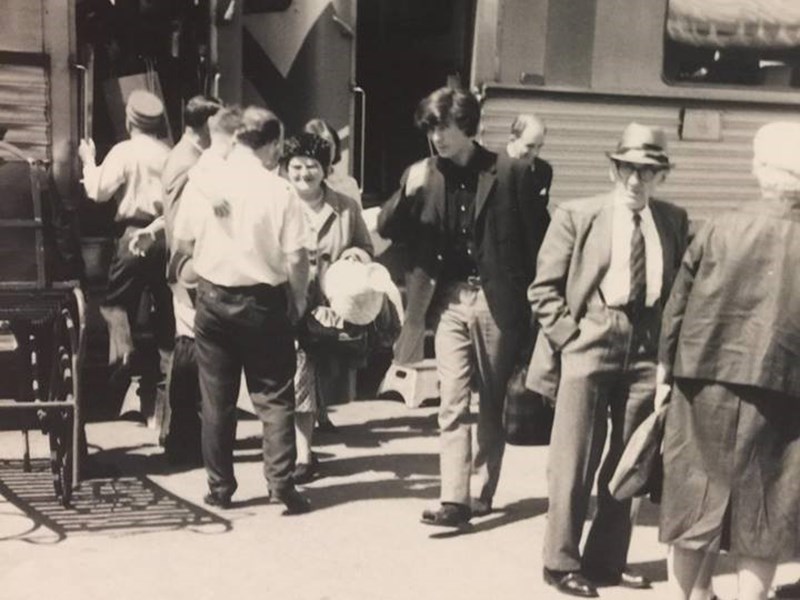Previous chapter [“The gift,” November 30]: After a standoff between my indignant friend Rory and the towering Bernard the German, my friends and I made it to our family cabin in Desolation Sound north of Powell River and forgot about the whole thing. That was until Bernard the German swung by in his boat offering a frosty keg of pilsner as an apology. It was a gesture of kindness that seemed to clash with his intimidating exterior. I wanted to find out more about this giant of a man, and it’s a story that started a world away from Desolation Sound.
Imagine being born into a country that many around the world held primarily responsible for instigating the deadliest conflict in human history. That was the reality of life if you were born in Germany in the late 1940s, shortly after the country’s unconditional surrender in 1945. It was in this scorched aftermath of penniless rubble and hunger, in a town called Trier, that Bernhard Karl Maria Krieger came into the world on September 4, 1949.
Trier is the oldest city in Germany. It’s located on the picturesque banks of the Moselle River, nestled in wine country and surrounded by vine-covered hills of red sandstone. It’s just a few minutes away from the Luxembourg border.
During the war, Trier was very close to the Western Front. At times late in the war, Trier was heavily bombarded by the Americans almost every day. By the time the World War II was over, much of Trier was destroyed, including the Kriegers’ family home.
Bernhard Krieger was born into a family of 14 children: 10 boys and four girls. His father was a highly regarded town doctor, and his mom was a midwife. They delivered babies all over town, including all of their own children.
Before the war, the Kriegers were a wealthy and prestigious family; Dr. Krieger had one of the first cars in town. The family were devout Catholics and decidedly anti-Hitler and anti-fascist.
Despite their dangerous political and religious leanings, Dr. Krieger was forced to spend much of the war right on the nearby front lines, serving as a combat medic for the German infantry. Some of the older Krieger children were forced to join the Hitler Youth, but because of their young age, all of the Krieger children managed to avoid the army.
When the war ended, with their home, city, country and economy in ruins, the Kriegers had to rely on the kindness of their rural patients for food and shelter, as well as American aide packages. Bernard’s sister Roswitha can still remember American soldiers delivering bright orange cheddar cheese as they slowly rebuilt their home.
The war was over but Dr. Krieger had a new fear: the potential of a Soviet invasion from the east. He became determined to get his huge family out of Germany. Dr. Krieger’s dream was to safely relocate them all to the wide-open frontier of Canada.
It took years, but the Kriegers made it happen. First a few of the older siblings came, and when Dr. Krieger and his wife retired in 1965, they followed with their youngest son Bernhard. He was a very tall, lanky, shy and dark haired 16-year-old.
The Krieger family settled in Edmonton, and in turn, they moved from a city that was over 2,000 years old to one that hadn’t yet turned 100. When Bernhard Krieger emerged from the train on the platform on a sunny day in Edmonton in 1965 with his parents, he could have been mistaken for a member of the Rolling Stones. He was a nattily attired, slender boy with a neat blazer, button down shirt, and shock of long, wavy black hair.
Bernhard Krieger was enrolled in St. Joseph High School. He did not speak a word of English. Unfortunately, despite his size, he was immediately the target of relentless bullying; they called him a Nazi, a Kraut, a Jerry. They would scrawl swastikas on his schoolbooks and on his locker.
Under strict orders from his parents, Bernhard was told to keep his head down and to not fight back. The bullying persisted: they called him “Hard Burn,” a play on his name Bernhard, which eventually led him to change his name to the more English-sounding Bernard.
When it felt like the anti-German bullying couldn’t get any worse, Bernard finally took matters into his own hands, or feet, as it turned out. You’ll read that story in the next chapter of Bernard the German, the tragic tale of the Giant of Desolation Sound.
Grant Lawrence is an award-winning author and a CBC personality who considers Powell River and Desolation Sound his second home. "Bernard The German" is currently also airing as a weekly radio serial on North by Northwest, CBC Radio One in BC. Anyone with stories or photos they would like to share of Bernard "The German" Krieger, can send an email to [email protected].



